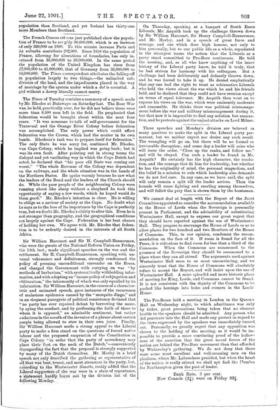Sir William Harcourt and Sir H. Campbell-Bannerman; who were the
guests of the National Reform Union on Friday, the 14th inst., made significant speeches on the war and the settlement. Sir, FI:Ca,nipbell-Bezinerman; speaking with un- usual vehemence and definiteness, strongly condemned the policy of, pressing, unconditional surrender on the Boers, and charged the Government with carrying on war "by methods of barbarism," with systematically withholding infor- mation, and with adopting an" insane policy of subjugation and obliteration," the inhumanity of which was only equalled by its infatuation. Sir William Harcourt, in the course of a character- istic and animated speech, gave instances of the recurrence of -malarious epidemics caused by the "mosquito Jingo," and inan eloquent panegyric of political consistency declared that "no party has ever repaired defeat by borrowing the name, by aping the conduct, and by professing.tha _faith of those to whom it is Opposed," an admirable sentiment, but rather azidaelouein the mouth of the inventor Of a phrase about certain pole' being allowed to stew in their own juice. Finally, Sii' William Harcourt made a strong appeal to the Liberal party to make a firm stand on the questions of forced native labour and the proposed suspension of the Constitution in Cape tolony, "in order that the party of ascendency may place their' foot on the neck of the Dutch,"—conveniently disregarding the fact that the proposal is strongly supported by -many of the Dutch themselves„ Mr. Morley in a brief speech not ezilY described the gathering as _representative of all that was heit, truest, and mot Strenuous in the party, but, aceordine. to the Westminster Gazette, rashly added that the Liberal supporters of the War_ Were in -a state of repentance, a statement hardly borne ont by the division list of the following Monday.










































 Previous page
Previous page